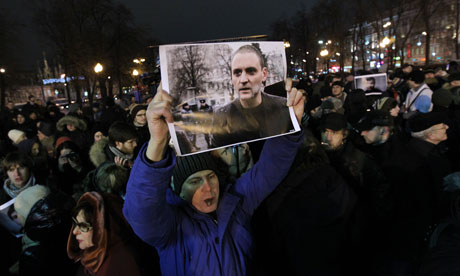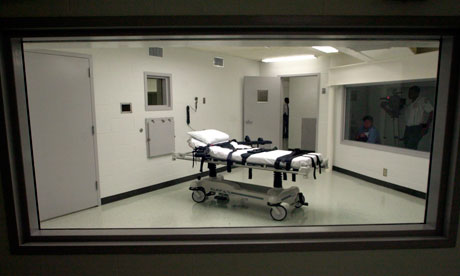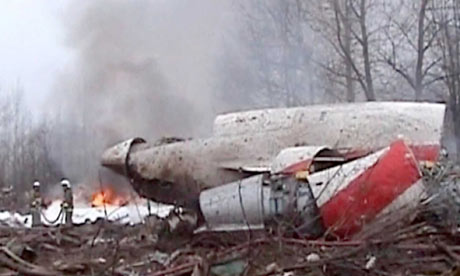By Terance Walsh
Impunity Watch Reporter, Europe
MOSCOW, Russia — Protests over the jailing of Russian activist Sergei Udaltsov took place in Moscow today. The protests were not sanctioned but were smaller than expected and passed without incident, perhaps signaling a cooling of political unrest following teeming protests in Russia last month. About two hundred Russians participated in the protests although two thousand indicated their intention to attend on social media outlets.

The jailed activist, Udaltsov, is the leader of the socialist party Left Front. He has been arrested over a dozen times but has failed to attract any attention outside a small core of supporters. Udaltsov was arrested on December 5th upon allegations of jaywalking and has been in prison ever since. Twice during his stay in prison Udaltsov has been admitted to the hospital for health problems caused by his hunger strike.
City officials in Moscow had denied the protestors a permit to gather, but Udaltsov’s wife, Anastasia Udaltsov, encouraged people to show up in Moscow’s Pushkin Square for the rally anyway.
There was a worry that the demonstrations would turn violent. A source in the Moscow police department said if the protestors did not comply with prescribed meeting formats the police would intervene. “Any attempts to abuse the format of the meeting will be viewed as violations, which the Moscow police must stop in strict compliance with the law,” he said.
Leaders of the gathering told protestors not to bring placards, chant slogans, or confront the police. Instead participants brought photographs of Udalstov or simply stood silently on the steps of the monument. A few people chanted simple phrases like “freedom for political prisoners” or used mega-phones to demand Udaltsov’s release. Protestors were relieved when the demonstration went off without a single recorded arrest.
The Udalstov protests are the latest in a series of the largest protests Russia has seen since the collapse of the Soviet Union in 1991. The underlying thrust of the protests has been the perceived election fraud that occurred in the December 5th parliamentary elections.
Authorities’ response to the Udaltsov protests were soft, likely as a result of the lessons they learned after early protests resulted in violence and greater turnout. The protests on December 5th were broken up and opposition leaders were jailed. A few days later the crowd swelled to about 40,000 in Bolotnaya Square. On December 24th the protests surged further to a crowd of 80,000 people.
Prime minister Vladimir Putin denied the protestors’ demands for a re-run of the parliamentary elections, but did take a conciliatory turn and said he would be willing to sit down with opposition. His offer, however, was without substance as he followed his offer to meet with opposition by remarking that there was no opposition. “Is there a common platform? No. Who is there to talk to?” he said.
Assistant to a law maker who was behind the demonstration Alexei Sakhnin, 30, said the protests were a statement to authorities that the political unrest was not yet ready to subside.
“The regime wants to clear the movement and divide it up the middle between radicals and moderates — these are their definitions of course — to show that there are people who will never be included at the negotiating table,” said Mr. Sakhnin, who carried his 4½-year-old son to the rally on his shoulders. “That would of course be the death of the movement.”
Anti-corruption protestor Aleksei Navalny said that if violence broke out and riots took place in the street then it would be the judge that presided over Udaltsov’s case who would be to blame. Udaltsov also received support from television host Tina Kandelaki, who is known to have connections with the Kremlin. She wrote an open letter on Thursday calling for his release.
Udaltsov, in a speech delivered from his hospital bed that was projected onto large screens, channeled the Occupy Wall Street Movement. He dubbed the protestors the “99 percent” who were being ruled and oppressed by the corrupt “1 percent” of bureaucrats and oligarchs. He remains in the hospital due to health concerns following his hunger strike.
For more information please see:
CBC News — Moscow Anti-government Protests Avoid Crackdown — 29 December 2011
The Guardian — Protests for Jailed Activist Passes Off Peacefully — 29 December 2011
NY Times — Russians Rally for Sergei Udaltsov — 29 December 2011
Radio Free Europe/Radio Liberty — Opposition Activist Rally in Central Moscow — 29 December 2011
Washington Post — Several Hundred Demonstrators in Moscow Demand Release of Opposition Activist — 29 December 2011
Kyiv Post — Police to Stop Opposition Action in Moscow — 28 December 2011



